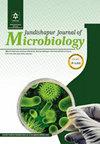Identification of Etiological Agents of Pertussis-Like Syndrome in Children Younger Than 5 Years Old Hospitalized in Southwestern Iran
IF 0.5
4区 医学
Q4 MICROBIOLOGY
引用次数: 0
Abstract
Background: Despite the global vaccination program, there are many new cases of pertussis in different societies annually. Objectives: This study aimed to investigate the prevalence of some microorganisms associated with pertussis-like syndrome and compare the clinical presentations between Bordetella pertussis and pertussis-like syndrome in children. Methods: Children younger than 5 years old suspected of pertussis-like syndrome were admitted to a hospital in Ahvaz, Iran, and examined from July 2018 to July 2019. Nasopharyngeal samples were evaluated using molecular methods. The studied microorganisms were the following: B. pertussis, B. parapertussis, Mycoplasma pneumoniae, Chlamydophila pneumoniae, adenovirus, respiratory syncytial virus, and parainfluenza virus type III. Results: Forty-five children were enrolled. B. pertussis was detected in 15 cases (33.3%), respiratory syncytial virus in 14 (31.1%), C. pneumoniae in 3 (6.7%), and parainfluenza virus type III in 3 (6.7%). The collected samples were negative in terms of M. pneumoniae, adenovirus, and B. parapertussis. In the case of paroxysmal cough, the clinical symptoms were significantly different between pertussis and pertussis-like groups. Conclusions: The results indicated that children with pertussis-like syndrome are commonly infected with B. pertussis and respiratory syncytial virus, so more attention should be paid to this issue. The study also demonstrated the importance of molecular diagnosis methods, along with diagnosis based on clinical symptoms, in children suspected of pertussis-like syndrome.伊朗西南部5岁以下住院儿童百日咳样综合征病原学鉴定
背景:尽管全球疫苗接种计划,每年仍有许多百日咳新病例出现在不同的社会。目的:本研究旨在调查与百日咳样综合征相关的一些微生物的流行情况,并比较百日咳博德泰菌和百日咳样综合征在儿童中的临床表现。方法:2018年7月至2019年7月,对伊朗阿瓦士一家医院收治的5岁以下疑似百日咳样综合征儿童进行检查。采用分子方法对鼻咽标本进行评价。研究的微生物有:百日咳、副百日咳、肺炎支原体、肺炎衣原体、腺病毒、呼吸道合胞病毒和副流感病毒III型。结果:45名儿童入组。百日咳15例(33.3%),呼吸道合胞病毒14例(31.1%),肺炎支原体3例(6.7%),副流感病毒3例(6.7%)。收集的样本在肺炎支原体、腺病毒和副百日咳分枝杆菌方面均为阴性。在阵发性咳嗽的情况下,百日咳组和百日咳样组的临床症状有显著差异。结论:百日咳样综合征患儿感染百日咳双歧杆菌和呼吸道合胞病毒较为常见,应引起重视。该研究还证明了分子诊断方法的重要性,以及基于临床症状的诊断,在怀疑患有百日咳样综合征的儿童中。
本文章由计算机程序翻译,如有差异,请以英文原文为准。
求助全文
约1分钟内获得全文
求助全文
来源期刊

Jundishapur Journal of Microbiology
MICROBIOLOGY-
CiteScore
1.30
自引率
0.00%
发文量
56
审稿时长
6-12 weeks
期刊介绍:
Jundishapur Journal of Microbiology, (JJM) is the official scientific Monthly publication of Ahvaz Jundishapur University of Medical Sciences. JJM is dedicated to the publication of manuscripts on topics concerning all aspects of microbiology. The topics include medical, veterinary and environmental microbiology, molecular investigations and infectious diseases. Aspects of immunology and epidemiology of infectious diseases are also considered.
 求助内容:
求助内容: 应助结果提醒方式:
应助结果提醒方式:


